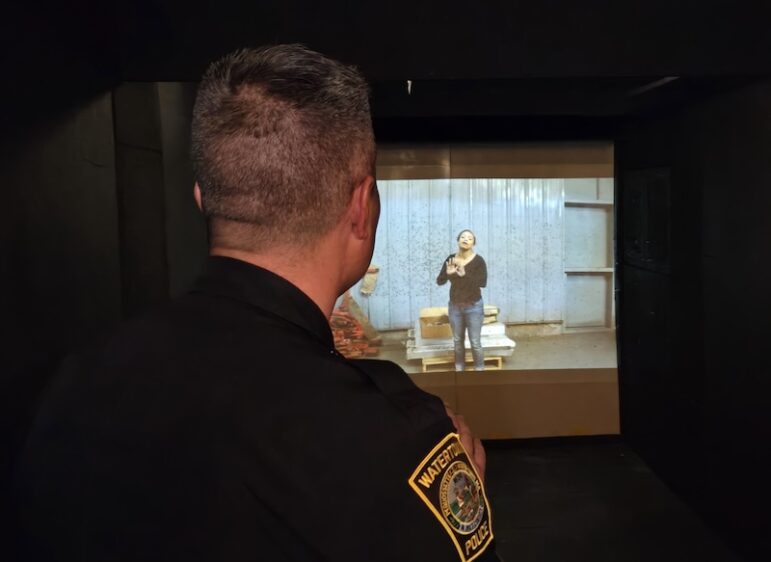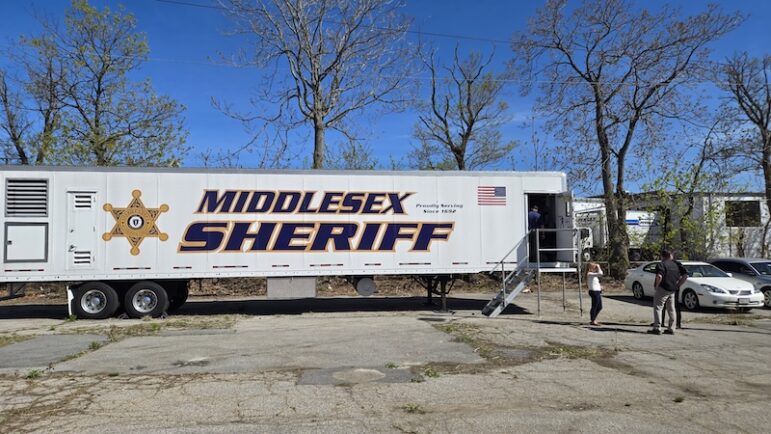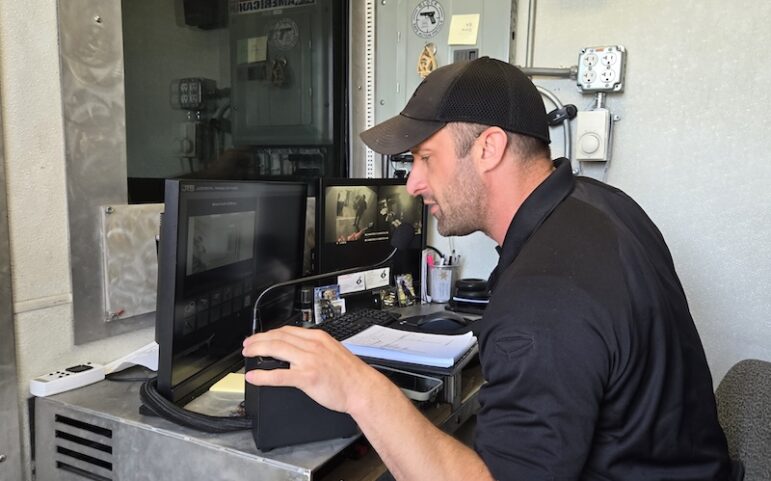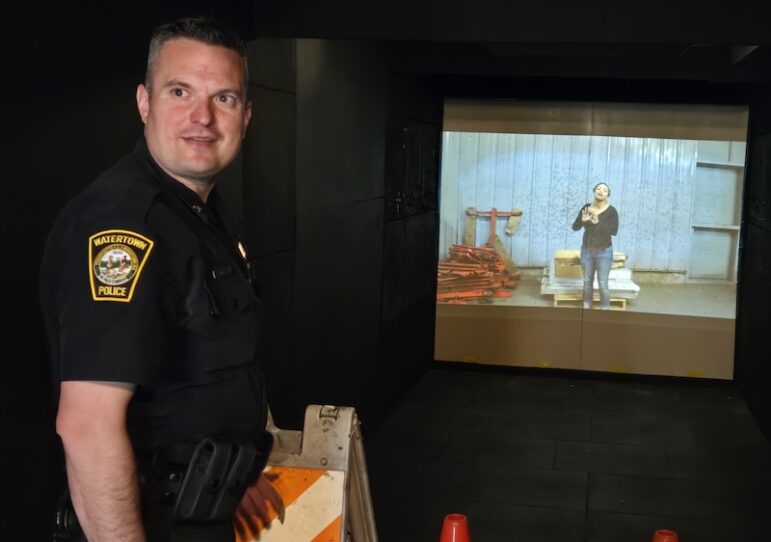
A trailer parked on a vacant lot in Watertown appeared quiet and tranquil from the outside, but inside Watertown Police officers faced intense situations in which they sometimes had to draw their firearms and even fire real bullets.
The Middlesex Sheriff’s Office recently parked its Mobile Training Center on the former Sterritt Lumber site on Waltham Street for a week, so that the Watertown Police could take part in real world simulations with videos while using their own equipment.
Lt. Kevin McManus, who oversees the WPD’s Training Division, said having the training center in town allows officers to go through some of the most realistic training while having the convenience of going through it while they are on a normal shift.
The training center uses a system created by Laser Shot, and offers more than 600 different scenarios.
“All these things, either our own officers have encountered them, or it’s been something that’s either been locally or even nationally that’s made some mainstream media attention,” McManus said.
During the simulations, officers get a chance to decide when to use the various tools they can access while on duty, McManus said, including: pistols, rifles, less-lethal shotguns, tasers, pepper spray and batons.
On the afternoon that Watertown News visited the Mobile Training Center, Watertown Police Officer Mike Hill went through the training. He stopped by during his shift and in the course of about 20 minutes, he went through three scenarios.
In the first, a woman flagged him down and said there was a man who had a gun and was threatening to take his own life. Hill was able to convince the man to put the gun on the ground. During the second one he came across a woman in a building where a reported robbery in progress was taking place. She had a knife and he got her to drop it. The final scenario was a traffic stop where the driver suddenly got out of the car and pulled a gun. Hill yelled at the man to put the gun down and when he did not Hill fired and hit the man.
“Every scenario kind of escalates quickly,” Hill said. “But, yeah, we do this every year, so it kind of helps mentally, which is good for on the street as well. The training, you get to think fast here, that way it transitions into the street when you have to think fast, at least, that’s what the goal is, hopefully, right? It’s good to be in that mental stage. God forbid we’re in a scenario such as any of these.”
Hill said the Watertown Police deal with mental health calls, but he has not had anything like the traffic stop.

The scenarios in the Training Center do not always go the same way, said Middlesex Sheriff’s Officer Ed Welch, who runs the training — along with Officer Ryan Abrams — from a booth inside the trailer. Oftentimes training officers from the local police department is also there.
“We can actually change it as it is going along,” Welch said. “So it might not be perfect. You’ll be talking to the person, and I think they might be reaching their pocket doing all of this, and you’re like, ‘Hey, get your hands out of your pockets!'”
Sometimes during the training the person takes his hands out of the pocket, but other times he keeps fumbling around and pulls something out. In that case, an officer could use pepper spray or even a taser, which can be seen on the screen.
“When they spray, we can hit a button and the person will act like they got sprayed and go down like a ton of bricks,” Welch said. “And, same with taser. They come up, give it that ride — five second with the training taser — so they’ll get the full impact of them using their less lethal and see on the screen, they react.”

The police going through the training get immediate feedback on how they handled the training scenario.
“A big part of this is the debrief. So after a scenario, we always talk to the guy,” Welch said. “I always give him good points. It’s like, you know, ‘Hey, great job. You got off the X, you got behind effective cover. You did this. You did that.’ Also sometimes we’ll ask them, ‘Hey, what did you see? What did you do? What could be done different?’ And sometimes it might be, ‘I wouldn’t do anything different,’ you know, and ‘That’s perfectly fine.'”
The training allows officers to apply the policies in real world situations.
“This is a great way to do it because you can sit in a classroom all day long, read policy, and it’s not going to do you any good until you actually do it,” Welch said. “And then you can sit there and have people do the wrong thing, and, you know, make a mistake. No big deal. It’s better to be in (the training center) than out here (in the real world).”
The officers practice modern policing techniques, said Kevin Maccioli, Director of Media Relations & Public Information for the Middlesex Sheriff’s Office.
“There is really just heavy emphasis on the communication and de-escalation, and really utilizing what those modern tools that officers have today to put them into practice here, and take that out with them to calls,” Maccioli said.
Having the Mobile Training Center available for many hours each day for a whole week is a game changer, McManus said.
“I think the biggest thing that we’re taking from this is that they’re going to come through here right while they’re on duty. A lot of our training is OK. Today is the training day. You’re here for eight hours. Usually it’s on a time off, or you are detached from a shift. You come in and you have a training mindset,” McManus said. “Right here, they’re working, they’re coming in, they’re working through these skill building drills, and then they go through four scenarios, and then they take any input, and they can take it right onto the street.”

While the bullets used by the officers are live rounds, they are firing range ammunition that are not as powerful. The interior of the trailer is covered in thick, hard plastic that absorbs the bullets. They are replaced every three or four months, Welch said. The training officers sit behind bullet-proof glass.
The training area has negative air pressure, Welch said, so any smoke from bullets, or even pepper spray will be sucked out without affecting the officer.
“The air goes through four sulfur filtration systems. So we have paper filters and HEPA filters when it gets pulled out, so nothing gets in and out of here,” Welch said. “We’ve actually had deployments. Guys by accident, have sprayed, instead of grabbing the inert spray, they use theirs and actually sprayed, and it’s nothing. So it’s that good of a system that it actually pulls everything up.”
The Middlesex Sheriff’s Office obtained the Mobile Training Center in 2010 and it went into service in 2011, Maccioli said. The Mobile Training Center is a much highly sought after by police departments. For several weeks each year it is used to train the Middlesex Sheriff’s officers, most of whom are assigned to the House of Corrections in Billerica, Maccioli said, and after that police departments around Middlesex County can use it. Most departments in the county have used the Mobile Training Center, along with a few communities in Essex and Worcester counties.
Few places have the Laser Shot system, and only a handful have ones that can travel. The Middlesex Sheriff’s Office has the only one in Massachusetts, and Welch said he believes there are fewer than 10 in the country. Because of that, he said, the Middlesex Sheriff’s trailer is booked through April 2026.